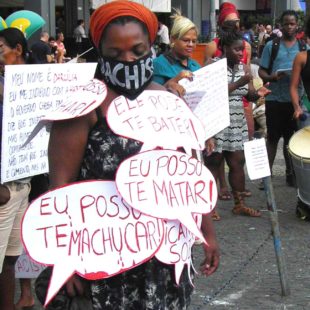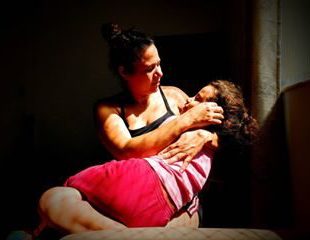20/07/2020 10:46
Daniela Meirelles, Luiza de Marillac, Monica Ponte and Rosimere Nery¹
All of a sudden a pandemic swept into our lives, demanding even more of women who were already overburdened and overlooked, in their myriad occupations. How to stay healthy amidst so many challenges? How do we care for others and not neglect ourselves? In our society, the practice of caring and solidarity has become an inherent part of a woman’s life, used to caring for people and things around her. Acts of caring, however, also generate emotional strain, overload and sacrifice. The need to deal with the spread of the new coronavirus centers precisely on the ambiguity of women’s social position, when forced to take on new tasks in their private space, once their safe haven and respite.

Demonstration at Carioca Square, Rio de Janeiro, 2015. Photo: Rosilene Miliotti/FASE
The pandemic poses enormous challenges for women, and existing inequalities have been compounded for black, poor and peripheral women, especially in terms of unemployment, precarious work and structural racism. Confinement exposes women to even greater social vulnerability, including the risk of domestic violence, when they are forced to spend most of the time with their aggressors. This situation has been aggravated and intensified during the pandemic by the reduction or shutdown of public services such as the Social Assistance Reference Centers (CRAs), Specialized Social Assistance Reference Centers (CREAs) and Women’s Police Stations. Already underequipped to deal with this violence, now it is even harder for them to receive, notify and protect women.
According to Daniel Freeman, a psychologist at Oxford University, women’s psychological health has been particularly affected. They are more likely to suffer from anxiety, depression and other illnesses, because their daily lives combine domestic chores with caring for their sons and daughters and the family in general. Fears and uncertainties are compounded by financial and food insecurity. Some of them must leave home to work, especially the single mothers, while others have to adapt to an intense regime of remote “home office” work. Family farmers and artisanal fisherwomen, in many cases, find it hard to market their produce, while public food procurement programs have also been cut back². Outside support available to many women before the pandemic, such as schools and daycare, has shut down. Grandmothers, who played a major role in this care, are in a risk group and must be spared. The relaxation of social isolation in many states has not taken this into account as an aggravating factor for women’s availability.

Seamstress during the pandemic. Photo: Rosilene Miliotti / Images the people
Gender-related consequences of the pandemic cannot be minimized. The health crisis highlights the cruel plight of people living in such an unequal country, where the poor and mostly black population suffer the worst effects. They also often live in areas with severe limitations on access to water, sanitation and decent housing, all fundamental for cleanliness.
Taking care of myself, to be able to care for anyone else.

Mother and daughter during the pandemic. Photo: Francisco Valdean / Images the people
Caregiving can be seen as a place of power for women, where caring for one’s self, for one another and for others, being cared for and responding to care are all elements of women’s social history. The knowledge, experiences and capacities they gain and possess reflect their struggle for emancipation, based on principles such as solidarity, affection, reciprocity and horizontal relations. This is perhaps why countries led by women have stood out in the fight against the pandemic. New Zealand, Germany, Taiwan and Norway, all with women setting policy, are having relatively fewer deaths caused by Covid-19. We know that other factors also have a bearing on this outcome, but the fact that they are governed by women stands out.
Actions by civil society organizations are essential contributions to the pandemic response. FASE continues to do its popular education work with women in the social organizations and movements with which it works. This context has challenged our institution to reinvent itself in order to keep up with and strengthen women’s capacities for political interaction. Throughout the process, we have supported initiatives for access to water, minimum income, food, access to public services and against domestic violence. This involves creating spaces for dialogue, listening, handling conflict situations and carrying out solidarity actions such as donations of food, masks and hygiene kits. We also see these actions as forms of political advocacy.
Faced with the limits of life, women have much to contribute through their choices and by doing what must be done. If respected, included and valued, we can propose post-pandemic horizons where our nature finds balance and life flourishes. Even if they want to shut us up, we will not be silent!
We call on all women to take care and to devote more time to themselves, as a form of resistance!
[1] Members of the Community Fund and Action Working Group: Daniela Meirelles, FASE educator in Espírito Santo; Luiza de Marillac, FASE coordinator in Pernambuco; Mônica Ponte, SAAP Fund; and Rosimere Nery, FASE educator in Pernambuco.
[2] The federal government’s Food Procurement Program and National School Meals Program










